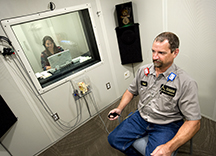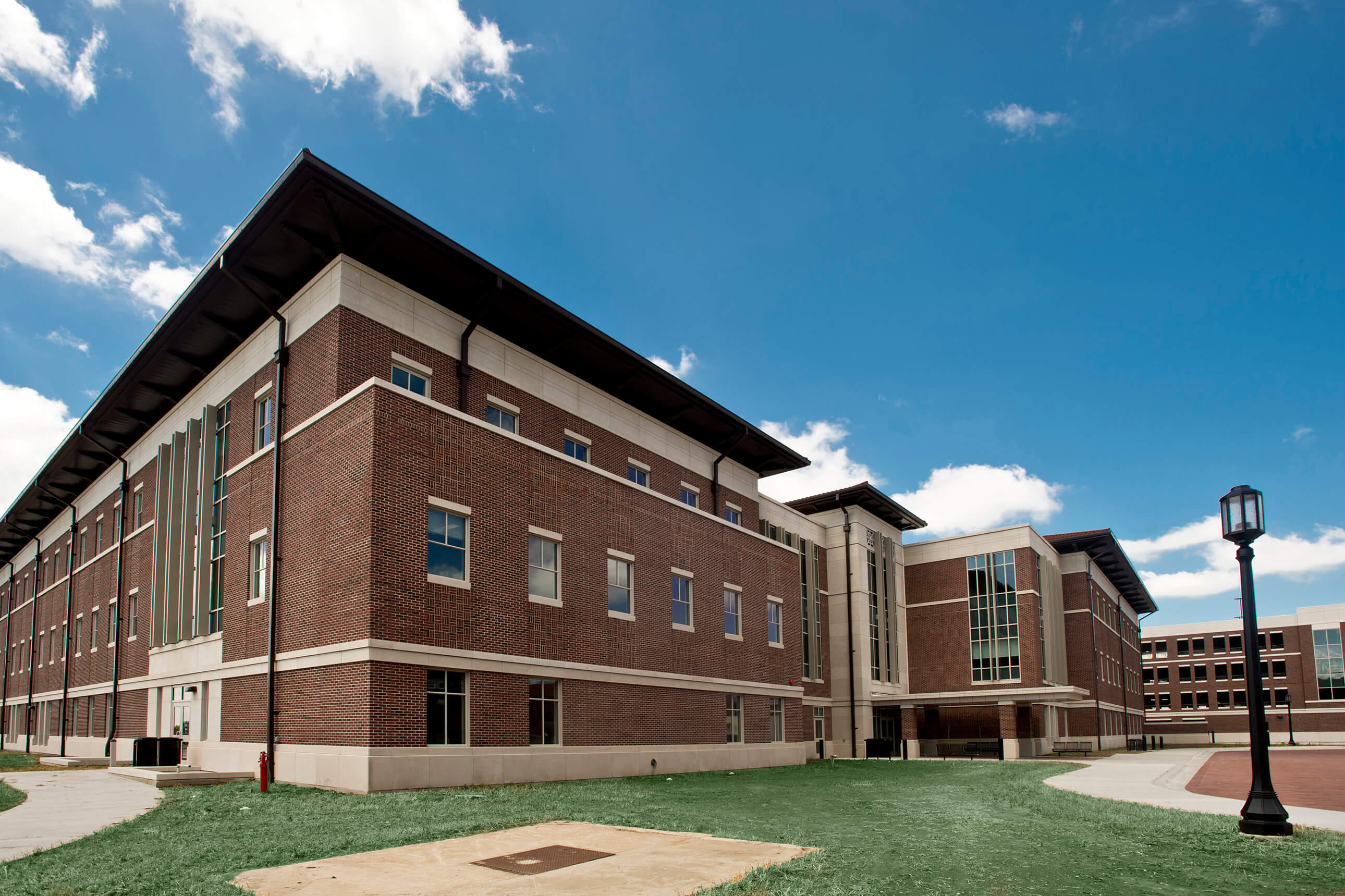Purdue dedicates building for speech, language and hearing sciences
September 29, 2014
WEST LAFAYETTE, Ind. - On Friday (Sept. 26) Purdue University dedicated Lyles-Porter Hall, which will house one of the nation’s top speech, language and hearing sciences training and research programs as well as its specialty patient services for North Central Indiana.
“Thank you to Marybeth Lyles-Porter Seay for honoring her family legacy as well as supporting a facility that serves thousands of Indiana residents and is the home to breakthrough discoveries such as new technologies to help Parkinson’s patients communicate,” said Purdue President Mitch Daniels. “When Indiana residents walk through the doors of Lyles-Porter Hall, they truly will experience quality care and engage with students who also are working with and learning from some of the top researchers and clinicians in these fields.”
 |
|
Purdue doctor of audiology student Jaime Wesley checks the hearing of university employee Scott Scheurich during a hearing test at the Audiology Clinic in the new Lyles-Porter Hall. The new building is home to the Department of Speech, Language and Hearing Sciences. (Purdue University photo/Mark Simons) |
The more than 60,000-assignable-square-foot facility, located at the northwest corner of Harrison and University streets, is named in honor of a $10 million gift from Seay of Visalia, California. The total funding for the building is $38 million, and in addition to Seay’s gift, state bond proceeds and private gifts were used to fund the building.
Seay is a retired speech pathologist who earned her bachelor's degree in speech-language pathology in 1959.
“Family and health are very important to me,” Seay said. “I am a third-generation Boilermaker who enjoyed a successful 20-year career as a speech pathologist thanks to my start with a Purdue education. This building is to honor my family, specifically, the grandfathers of my four children. My father, William M. Lyles Jr., graduated from Purdue in civil engineering, as did my late husband's father, George A. Porter. My mother, Elizabeth Lyles, also earned her bachelor's and master's degrees in education.”
The more than 20 speech, language and hearing research labs in Lyles-Porter Hall focus on a wide array of speech, language and hearing topics such as creating better hearing aids, understanding and treating child communication disorders, identifying brain mechanisms related to stuttering and autism, advancing vocal-chord health, and improving treatment of aphasia.
“Research by Purdue’s speech, language and hearing sciences faculty has led to innovative treatments and designs, such as SpeechVive, the device to help Parkinson’s patients, and the SPEAKall! A new app to help young children with severe, non-verbal autism communicate,” said Christine Ladisch, dean of the College of Health and Human Sciences. “This facility will help prepare the next generation of speech and hearing professionals to make life-changing breakthroughs.”
The facility houses 30 sound booths for both research and patient visits, as well as new research equipment including advanced methods for measuring brain activity and mapping children’s movements and motor control in 3-D. Findings from this research are applied in clinical settings around the world in addition to Purdue’s own M.D. Steer Audiology and Speech-Language Clinics in Lyles-Porter Hall.
“Patients of all ages are served from early morning through the evening at our clinics,” said Keith Kluender, professor and head of the Department of Speech, Language and Hearing Sciences. “For many people, Lyles-Porter Hall will be the face of Purdue.”
The Audiology Clinic provides a full range of diagnostic and rehabilitative services to infants, children and adults. Services include hearing testing, counseling and referrals. The clinic also dispenses hearing aids and assistive listening devices. About 1,800 patients are seen every year, and they range from a few weeks of age to people older than 100. The department also is one of Indiana’s primary diagnostic centers for infant hearing, seeing about 150 babies a year.
The Speech-Language Clinic sees almost 1,700 clients per year and offers many programs for people at all stages of the life span. Beginning with a Birth-to-Three Program, the Purdue Preschool Language Program and after-school programs, children and adults participate in individual and group programs ranging from those for treatment of swallowing and voice disorders to the BrainBuilders program for clients with dementia.
In addition to the Department of Speech, Language and Hearing Sciences, the building also is home to the nation’s second largest medical school’s area regional campus, the Indiana University School of Medicine – Lafayette. Other Purdue clinical spaces are occupied by parts of the School of Nursing, and parts of the departments of Nutrition Science, Psychological Sciences, and Health and Kinesiology. All of these units are in the university’s College of Health and Human Sciences.
 |
|
Lyles-Porter Hall is home to Purdue’s nationally known Department of Speech, Language and Hearing Sciences. (Purdue University photo/Mark Simons) |
There are currently 24 tenure-track and research faculty and 14 clinical faculty members in the Department of Speech, Language and Hearing Sciences. Purdue's speech pathology program began in 1935 to assist students who had speech problems. In 1948 the first doctoral degree was awarded. Purdue's programs were among the first in the country to achieve accreditation in speech pathology and audiology from the Educational Standards Board, now known as the Council for Academic Accreditation, of the American Speech-Language-Hearing Association.
Seay, who also completed a master's degree in audiology from California State University of Long Beach, worked in public schools in California, including Kingsburg, where she designed and implemented the first full-time speech therapy program.
The building is named for the grandfathers of her four children. The paternal grandfather is George A. Porter, who graduated with a bachelor's degree in civil engineering in 1922, and the maternal grandfather is her father, William M. Lyles Jr., who earned a bachelor's degree in civil engineering in 1935. Seay’s mother, Elizabeth Lyles, also earned a bachelor's degree in science in 1933 and a master's degree in science education in 1934. Seay’s grandfather, the late H. Gerald Venemann, graduated from Purdue in 1907 and retired from Purdue in 1954 as professor emeritus of mechanical engineering. Her brothers, Gerald V. Lyles and William M. Lyles, also are Purdue alumni. One of her four children, Thomas W. Porter, attended Purdue and earned a bachelor's degree in industrial engineering in 1985.
Writer: Amy Patterson Neubert, 765-494-9723, apatterson@purdue.edu
Related news release:
Purdue dedicates building for health research, training, patient services

